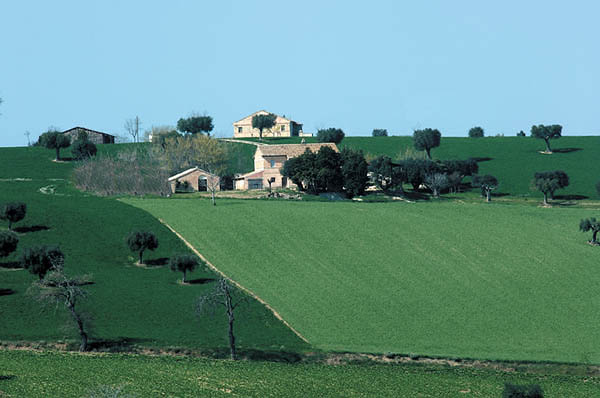

i sént i üzéi fè festa e la galìn'a,
l'è tùrna 'nsla strà
a fè 'l so vèrs.Fa serén,varda,
andùa cala 'l sul, ansla muntàgna;
sa s'ciarìs la campagna,
e ciar anlta val anche 'l fiüm la scur.
Tùrnu a séntsi i rumùr,
la gént cumincia ancura a travaiè,
al vén ansl'üs al frè
cun al travài an man,
al varda mè l'è 'l cél
antànt che 'l canta,
cula dunëta a sort e vén
piè l'acua növa dop la piöva;
l'è tùrna 'n gir che 'l crìa,
mè che 'l fa tüti i dì
cul che 'l va véndi i èrbi.
Al sul la spònta e 'l rid,
e 'l fa rìdi tüti 'l culin'i e 'l vìli.
I dörvu tüti : tràsi, fnèstri e balcòn:
ansla strà i car i arpìu 'ndè,
as séntu,luntàn i campanéi
e 'l sérc' di ròvi scrùsi 'nsìma 'l péri.
A ién tüti cuntént,
azmìa bèla la vita.
Ma quand cun püsè vòia
as tùrna a ia stüdi
e al travài.Ognadün ià piazì
da 'rpiè cul nén finì,
ad cumincèni iün növ.
E 'ntant as dizmantìu tüti i mài.
Piazì, fiö dal sagrìn;
Giòia fàusa ca nas quand cèsa la pagüra
Cul che dla vita a sàva nén che fèsni,
anche lü l'è pensà
dès chi i murùma;
la gént cun al baticör südàva frëd,
iéru lì tüti smort sensa paròli
an cél e 'n tèra na gran cunfüziòn
zmiàva che i rüziéisu al vent e i lòzni
cun la piöva e 'l tron,
o natüra curtéiza,
ién custi i to regài,l'è cust tüt al piazì
che 't dè a la nosa vita
Mèc al cesè dal mal, l'è chi tüt al piazì.
Ad pén'i tam nu dè an quantità,al dulùr
al vén bèli dasparlü;sensa che nui lu cèrcu,
quant al piazì,cul che d'ognintànt al vén après al mal,
l'è 'n ver miràcul, iùma da ténlu tam mè 'n gran guadàgn.
O l'omu la sta tant a cör cui che nanca i san lur
lonche sia mòri.L'è propi 'n furtünà se, cesà 'l mal
a pöl tirè 'l fià.L'è na cücagna
se ad tüti i so dulùr la mort lu san'a.
I hear the joyful birds, the hen,
returning to the path,
renews her cackling. See the clear sky
opening from the west, over the mountain:
the landscape clarifies,
the river gleams bright in the valley.
Now every heart is happy, on every side
thereís the noise of work
as they return to business.
The craftsman comes to the door,
his work in hand, singing,
to gaze at the humid sky:
a girl runs out to draw water
thatís charged with fresh rain:
and, from street to street,
the vegetable seller
raises his cry again
See the sun return, see how itís smiling
from hills and farms. The servants
open balconies, terraces, lodges:
hear the harness clinking, far off
along the highway: as the travellerís carriage
moves, once more, down the road.
Every heart is happy.
When was life as sweet,
as pleasant as it is now?
When did men turn
to their work, or bend to
their studies with such love? Or begin
some new venture? Or were so forgetful
of old wrongs? Joy is born of pain:
vain joy, the fruit
of fear past, in one shaken,
and fearful of death,
who abhorred life before:
fear that made men sweat and tremble
in enduring anguish,
shivering, silent, pale: seeing
lightning, cloud, and wind,
moving to attack them.
O kindly Nature,
these are your gifts,
these are the delights
you give to mortals. To be free
of pain is our delight.
You scatter ills with generous hands: grief
appears of itself, and pleasure, thatís so often
born of trouble, through the monstrous,
and the miraculous, is our only gain. The human
race, dear to the gods! Happy enough
to gain a breathing space
from sorrow: blessed
when death heals you of every grief.
Odo augelli far festa, e la gallina,
Tornata in su la via,
Che ripete il suo verso. Ecco il sereno
Rompe là da ponente, alla montagna;
Sgombrasi la campagna,
E chiaro nella valle il fiume appare.
Ogni cor si rallegra, in ogni lato
Risorge il romorio
Torna il lavoro usato.
L'artigiano a mirar l'umido cielo,
Con l'opra in man, cantando,
Fassi in su l'uscio; a prova
Vien fuor la femminetta a còr dell'acqua
Della novella piova;
E l'erbaiuol rinnova
Di sentiero in sentiero
Il grido giornaliero.
Ecco il Sol che ritorna, ecco sorride
Per li poggi e le ville. Apre i balconi,
Apre terrazzi e logge la famiglia:
E, dalla via corrente, odi lontano
Tintinnio di sonagli; il carro stride
Del passeggier che il suo cammin ripiglia.
Si rallegra ogni core.
Sì dolce, sì gradita
Quand'è, com'or, la vita?
Quando con tanto amore
L'uomo a' suoi studi intende?
O torna all'opre? o cosa nova imprende?
Quando de' mali suoi men si ricorda?
Piacer figlio d'affanno;
Gioia vana, ch'è frutto
Del passato timore, onde si scosse
E paventò la morte
Chi la vita abborria;
Onde in lungo tormento,
Fredde, tacite, smorte,
Sudàr le genti e palpitàr, vedendo
Mossi alle nostre offese
Folgori, nembi e vento.
O natura cortese,
Son questi i doni tuoi,
Questi i diletti sono
Che tu porgi ai mortali. Uscir di pena
È diletto fra noi.
Pene tu spargi a larga mano; il duolo
Spontaneo sorge e di piacer, quel tanto
Che per mostro e miracolo talvolta
Nasce d'affanno, è gran guadagno. Umana
Prole cara agli eterni! assai felice
Se respirar ti lice
D'alcun dolor: beata
Se te d'ogni dolor morte risana.